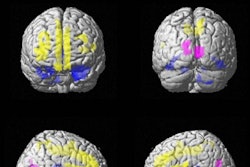Weill Cornell Medicine researchers in New York have received a five-year, $6.2 million grant from the National Institute on Aging to build a portable, high-resolution brain PET scanner, according to a report in the Cornell Chronicle.
The PET scanner will be upright so that patients can sit in a chair that travels with the unit, which will significantly improve portability and accessibility, and will be designed to detect brain diseases such as Alzheimer’s disease, the story noted.
The grant follows positive results of a proof-of-concept study published last year using a prototype called Prism-PET.





![Coronal and axial slice of the average cortical F-18 MK-6240 SUVR [standard uptake value ratio] image for each study population. SUVR images were corrected for partial volume effects and masked with the gray matter mask used for volume of interest delineation. Overall tau accumulation is comparable between the late-life depression (LLD, middle column) and non-depressed cognitively unimpaired comparison (HC, left column) groups, while abnormal tau accumulation, which is most pronounced in the mesial temporal lobe, can be seen in the mild cognitive impairment due to Alzheimer's disease group (right column). Image and caption courtesy of the American Journal of Geriatric Psychiatry.](https://img.auntminnie.com/files/base/smg/all/image/2024/07/Tau_depressed.66a16540ee0a1.png?auto=format%2Ccompress&fit=crop&h=167&q=70&w=250)














